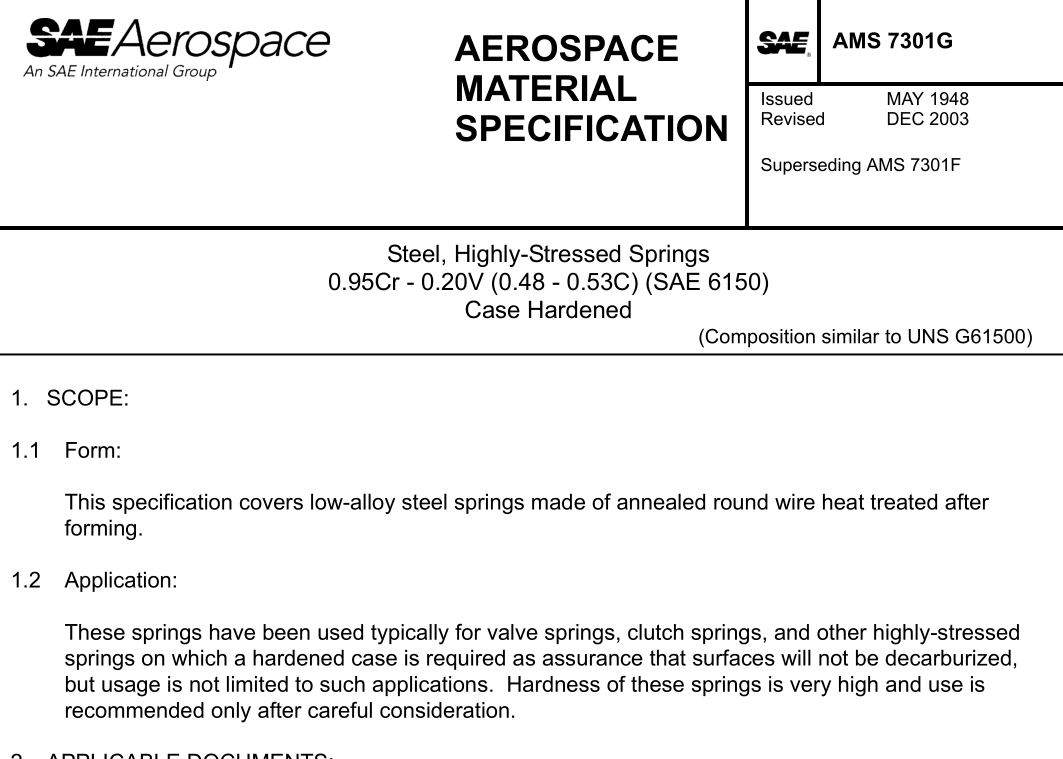SAE AMS 7301G:2003 pdf download Steel, Highly-Stressed Springs 0.95Cr – 0.20V (0.48 – 0.53C) (SAE 6150) Case Hardened
1. SCOPE:
1.1 Form: This specification covers low-alloy steel springs made of annealed round wire heat treated after forming.
1.2 Application: These springs have been used typically for valve springs, clutch springs, and other highly-stressed springs on which a hardened case is required as assurance that surfaces will not be decarburized, but usage is not limited to such applications. Hardness of these springs is very high and use is recommended only after careful consideration.
2. APPLICABLE DOCUMENTS: The issue of the following documents in effect on the date of the purchase order forms a part of this specification to the extent specified herein. The supplier may work to a subsequent revision of a document unless a specific document issue is specified. When the referenced document has been canceled and no superseding document has been specified, the last published issue of that document shall apply.
2.1 SAE Publications:
Available from SAE, 400 Commonwealth Drive, Warrendale, PA 15096-0001 or www.sae.org.
AMS 2259 Chemical Check Analysis Limits, Wrought Low-Alloy and Carbon Steels
AMS 2301 Steel Cleanliness, Aircraft Quality, Magnetic Particle Inspection Procedure
AMS 2370 Quality Assurance Sampling and Testing, Carbon and Low-Alloy Steel Wrought Products and Forging Stock
2.2 ASTM Publications:
Available from ASTM, 100 Barr Harbor Drive, West Conshohocken, PA 19428-2959 or www.astm.org.
ASTM E 18 Rockwell Hardness and Rockwell Superficial Hardness of Metallic Materials
ASTM E 112 Determining Average Grain Size
ASTM E 290 Bend Testing of Material for Ductility
ASTM E 350 Chemical Analysis of Carbon Steel, Low-Alloy Steel, Silicon Electrical Steel, Ingot Iron, and Wrought Iron
ASTM E 1444 Magnetic Particle Examination
3. TECHNICAL REQUIREMENTS:
3.1 Wire Composition:
Shall conform to the percentages by weight shown in Table 1, determined by wet chemical methods in accordance with ASTM E 350, by spectrochemical methods, or by other analytical methods acceptable to purchaser.
3.1.1 Check Analysis: Composition variations shall meet the applicable requirements of AMS 2259.
3.2 Condition of Springs:
Hardened and tempered after forming.
3.3 Fabrication of Springs:
3.3.1 Springs shall be formed on automatic spring-winding equipment.
3.3.2 When specified, ends of springs shall be ground flat.
3.3.3 Metal shall not be removed from any active coil.
3.3.4 Springs shall be heat treated by carburizing, cyaniding, or carbonitriding above the transformation range of the steel, quenching, and tempering. All possible care shall be exercised during heat treatment to prevent surface and internal cracking.
3.3.5 After heat treatment, springs shall be uniformly blasted all over, with grit of suitable size, for such time and in such manner as will produce springs which are satisfactorily cleaned and on which the surface effect is not deeper than that agreed upon by purchaser and vendor.
3.3.6 Grit blasted springs shall subsequently be uniformly blasted, preferably in automatic equipment, with sand of suitable size, for sufficient time to produce smooth surfaces. 3.4 Properties: Springs shall conform to the following requirements:
3.4.1 Hardness: Core hardness of springs shall be 65 to 69 HR30N, or equivalent (See 8.2), determined in accordance with ASTM E 18.
3.4.2 Average Grain Size: Shall be ASTM No. 5 or finer, determined in accordance with ASTM E 112.
3.4.3 Case Depth: Shall be 0.001 to 0.005 inch (0.03 to 0.13 mm) on springs, determined on a cross- section mounted, polished, etched in nital for sufficient time to develop a well-defined microstructure, and examined at a minimum of 100X magnification.
SAE AMS 7301G:2003 pdf download
